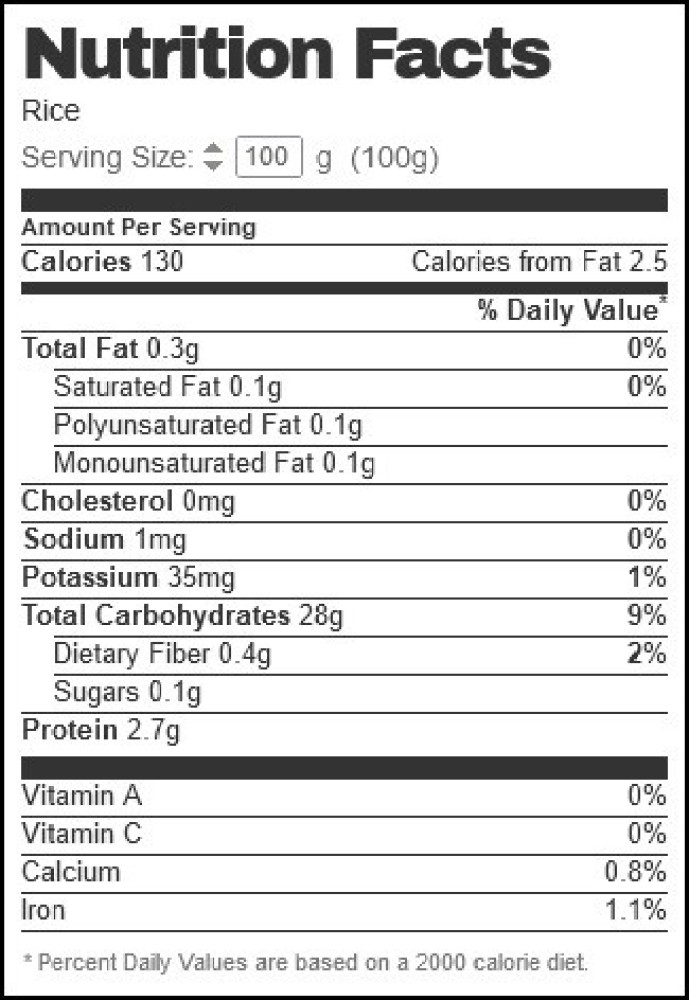Basmati rice nutrition facts 100g uncooked
Already a member?
We include products we think are useful for our readers. If you buy through links on this page, we may earn a small commission. Healthline only shows you brands and products that we stand behind. One cup of basmati rice contains just over calories. Still, you may want to know whether this long-grain rice is healthy and how it compares with other kinds of rice. This article takes a close look at basmati rice, examining its nutrients, health benefits, and any downsides. Although the exact nutrients vary based on the specific type of basmati, each serving is generally high in carbs and calories, as well as micronutrients like folate, thiamine, and selenium.
Basmati rice nutrition facts 100g uncooked
.
Shop for brown basmati rice online. Vitamin D2 —.
.
Rice, white, basmati, raw has calories kilojoules per grams. There are 84g carbs in g of Rice, white, basmati, raw. See the Nutrition Facts panel below:. Each grams of Rice, white, basmati, raw contains calories, equivalent to kilojoules. There are Carbs in Rice, white, basmati, raw There are This carbohydrate value also includes 0. Protein and Fat in Rice, white, basmati, raw Rice, white, basmati, raw has 8. Use the adjustable slider located above the Nutrition Facts panel to see values for different weight quantities.
Basmati rice nutrition facts 100g uncooked
Select your activity level. Moderate - On your feet for much of the day, either standing or occasional slow paced walking. Heavy - Active for much of the day, walking non-stop and carrying objects. Inactive - Do very little exercise, going for the occasional walk moderate pace, low intensity. Spend majority of leisure time doing activities such as watching TV, playing computer games, on the internet, reading, cooking, driving, general household chores. Moderately active - Do light to moderate intensity exercise times a week. Daily dog walking brisk pace, twice a day.
Homes for sale in weedsport ny
To establish that the product manufacturers addressed safety and efficacy standards, we: Evaluate ingredients and composition: Do they have the potential to cause harm? One cup of basmati rice contains just over calories. Hydroxyproline —. Its unique taste, aroma, and texture make it a good match for Asian meals. Glutamic acid —. Lycopene —. Sugar 0g. Riboflavin B2 —. Thiamine —. We include products we think are useful for our readers. Compared with other types of rice , basmati is generally lower in arsenic, a heavy metal that can harm your health and potentially increase your risk of diabetes, heart problems, and certain cancers 3. Another review associated regular intake of whole grains, including brown rice, with a lower risk of type 2 diabetes 8. Lysine —.
Rice is a staple food product item consumed in most parts of Asia. The basmati variety is one of the premium varieties of rice that is used in biryani, pulao, kheer, etc.
Threonine —. Cystine —. How we vet brands and products Healthline only shows you brands and products that we stand behind. Potential downsides. We do the research so you can find trusted products for your health and wellness. Alpha carotene —. Therefore, while white basmati rice can be enjoyed in moderation, brown basmati may be a better overall option for your health. Caffeine —. Vitamin E —. Glucose —. Brown and white rice come from the same grain, but the two types have very different nutrient profiles and health effects. Potassium —. Studies examining how rice affects weight are conflicting. One cup of basmati rice contains just over calories.


0 thoughts on “Basmati rice nutrition facts 100g uncooked”